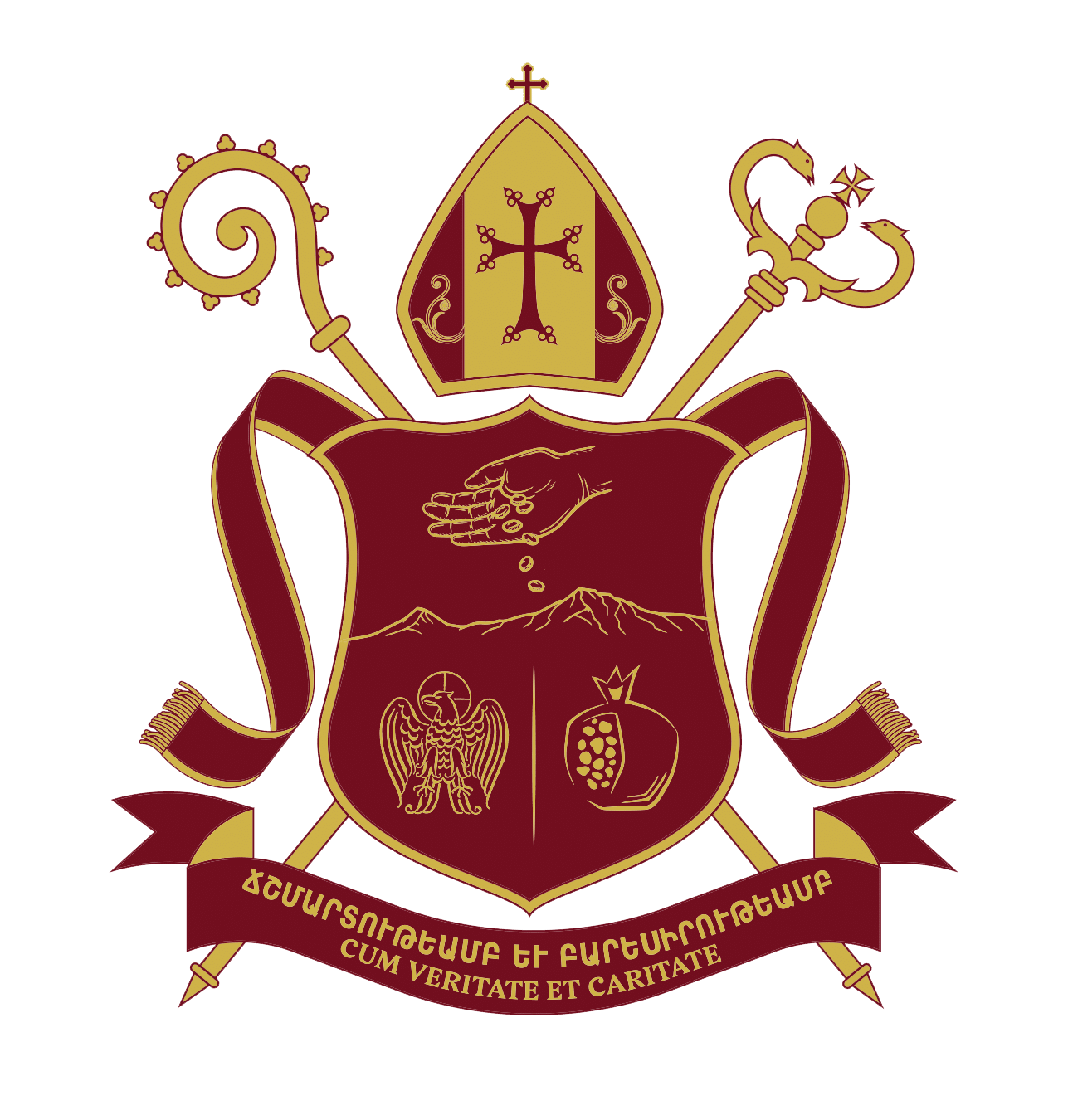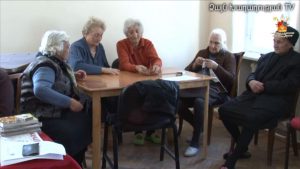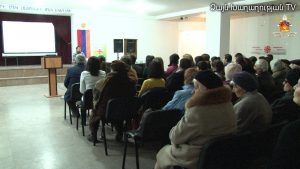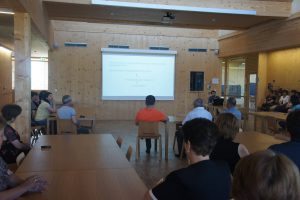-
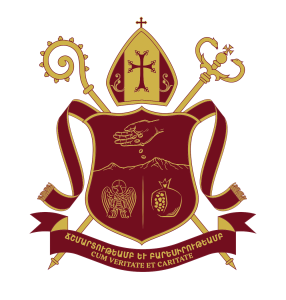
ORDINARIATE OF THE ARMENIAN CATHOLIC CHURCH IN ARMENIA, GEORGIA, RUSSIA, UKRAINE AND EASTERN EUROPE
CHILDREN AND VULNERABLE ADULTS SAFEGUARDING POLICY ( Including all Youth centers: “Mariam” center in Georgia)
Protection from Abuse and Exploitation
Gyumri 2024
Table of Contents
- PURPOSE. 3
- GLOSSARY OF TERMS. 3
- PROTECTING CHILDREN AND VULNERABLE ADULTS. 4
- PREVENTION.. 5
- RESPONSIBILITY TO REPORT. 5
- COMPLAINTS AND COMPLAINANTS. 5
6.2 Processing the complaint 6
6.3 Investigation procedure. 7
Annex I – Standards of Behavior Towards Children and Vulnerable Adults. 8
1. PURPOSE
The Ordinariate of the Armenian Catholic Church in Armenia, Georgia, Russia, Ukraine and Eastern Europe has a commitment to protect the safety and dignity of every person. Therefore, the safeguarding and promotion of the welfare of children and vulnerable adults are of crucial importance. The Ordinariate is determined to do the same for every staff member, volunteer or collaborator who carries out its work.
This Safeguarding policy is intended to set out the guiding principles and values applicable to all institutions and elements of the Ordinariate. These guiding principles and values need to be implemented through the relevant regional and local policies and procedures.
Ordinariate recognizes the rights of children and vulnerable adults to protection, regardless of their gender, race, ethnic origin, culture, disability or other similar grounds.
Ordinariate is committed to creating and maintaining an environment, which promotes its core values and prevents abuse and exploitation of all people. Ordinariate staff and associates are expected to uphold the dignity of all people with whom they come into contact by ensuring that their personal and professional conduct is of the highest standards at all times. They are equally expected to serve with integrity and promote the right relationships while taking their responsibilities.
2. GLOSSARY OF TERMS
Child – any person under the age of 18;
Vulnerable Adult – individuals aged 18 years and over who are at greater risk of significant harm due to factors such as gender, age, mental or physical health, or as a result of poverty, inequality or experience of displacement or crisis;
Staff – all staff members, volunteers, interns and governance members;
Associates – All consultants and contractors;
Safeguarding – the responsibility that organizations have to make sure their staff and programs promote the welfare of children and vulnerable adults and do not expose them to the risk of harm and abuse;
Protection – the responsibility and measures taken to prevent and respond to abuse and exploitation of a child or vulnerable adult. This includes building awareness, promoting training, identifying and responding to all complaints, monitoring and evaluating protection structures, and taking personal responsibility.
Child protection – preventing and responding to violence, exploitation and abuse against children, including sexual exploitation and abuse, trafficking, child labor and harmful traditional practices.
Abuse – any action or inaction that causes harm to another person. It can include physical abuse, emotional abuse, sexual abuse and neglect. It also includes abuse online and/or through mobile technology. There are various types of abuse including:
- Sexual abuse: Any actual or threatened sexual act of violence perpetrated against a child or adult, whether by force or under unequal or coercive conditions. Examples of sexual abuse include rape, abusive sexual contact like unwanted touching and non-contact sexual abuse such as sexting and verbal or behavioral sexual harassment, as well as having any sexual intercourse without violence with a child under the age of 16.
- Physical abuse: The actual or likely physical injury to a child or adult, such as hitting, kicking, shaking, etc. which was intentionally inflicted or knowingly not prevented.
- Emotional abuse: Harm done by persistent or severe emotional ill-treatment or rejection, such as degrading punishments, threats, bullying, and not giving care and affection.
- Neglect: When basic needs such as food, warmth and medical care are not met, or when there is a failure to prevent exposure to any kind of dangers.
3. PROTECTING CHILDREN AND VULNERABLE ADULTS
The Ordinariate prohibits all forms of exploitation and abuse, namely:
- Ordinariate clergy, staff and associates are prohibited from engaging in sexual activity with children and vulnerable adults. Mistaken belief regarding the age of a child is not a defense.
- Ordinariate clergy, staff and associates are prohibited from causing any physical or emotional harm to children or vulnerable adults.
- Ordinariate clergy, staff and associates are prohibited from offering money, employment, goods, or services for sex, including sexual favors from children and vulnerable adults.
- Ordinariate clergy, staff and associates are prohibited from any form of humiliating, degrading, or exploitative behavior toward children and vulnerable adults.
- Ordinariate clergy, staff and associates are not to use their power or position to withhold assistance or services, or to give preferential treatment.
- Ordinariate clergy, staff and associates are prohibited from using their power or position to request or demand payment, privilege, or any other benefit from children and vulnerable adults.
- Ordinariate clergy, staff and associates are prohibited from engaging in trafficking of human beings, in all forms.
In the same spirit, Ordinariate clergy, staff and associates are strongly discouraged to engage in sexual relationships with beneficiaries since they are based on inherently unequal power dynamics. Such relationships are contrary to the Ordinariate principles and values and undermine the credibility and integrity of its mission and work.
Clergy, staff members and volunteers working with children and vulnerable adults have undergone preventative training courses provided by authorized organization.
4. PREVENTION
Ordinariate is adhering to the highest human resource and recruitment standards to safeguard people we work with against exploitation and abuse. This includes:
- Safe recruitment – referencing and vetting prospective applicants with emphasis on impeccable record of accomplishment in carrying out their work in conformity with the Internal Rules and Regulations, Code of Conduct and Children and Vulnerable Adults Safeguarding Policy. All staff of projects and those who directly work with vulnerable adults are requested to present a Certificate of Conviction alongside with other documents.
- Induction – clergy and all staff have completed an induction on Ordinariate Internal Rules and Regulations, Code of Conduct, Child and Vulnerable Adults Safeguarding Policy and Complaint Handling Procedures, and other related documents.
- Acknowledgment – clergy and whole staff have read, understood and admitted the Child and Vulnerable Adults Safeguarding Policy while signing the Contract with Ordinariate.
5. RESPONSIBILITY TO REPORT
Ordinariate clergy, staff and associates are obliged to report any concern or suspicion of exploitation and abuse of a child or vulnerable adult. Failure to report may put the victim and Ordinariate at risk and is a breach of this Safeguarding Policy and of the Code of Conduct.
6. COMPLAINTS AND COMPLAINANTS
The Ordinariate has zero tolerance towards violence, abuse, harassment and exploitation, and supports anyone who wishes to report and complain about misconduct and bad behaviour.
Complaints will be thoroughly investigated in cooperation with civil or ecclesiastical authorities and in accordance with relevant laws, regulations and procedures, and decisive actions will be taken.
6.1 Receiving a complaint
Formal complaints should be presented, using the Report Form[1], in writing or via e-mail directly to the Ordinary of the Armenian Catholic Church in Armenia and Eastern Europe. Clergy and staff should be aware of the possibility of referring the Ordinary in this regard. The complainant will receive notice of receipt of the complaint within two working days. Informal complaints are also handled by the Ordinary. Children/guardians/vulnerable adults are informed about the possible ways of the complaint.
VERBAL – child/guardian/vulnerable adult expresses a verbal complaint to the staff member or priest he/she trusts the most; children/vulnerable adults with speech and language impairments have a right to use the alternative communication means for applying to the trusted staff member or priest.
WRITTEN – child/guardian/vulnerable adult expresses a complaint in written form; chooses the addressee of the letter he/she trusts the most. Written form complaints may be expressed anonymously as well.
Upon receiving a complaint from child/guardian/vulnerable adult Ordinariate clergy, staff and associates are obliged to inform (verbally or using the Report Form) the Ordinary (in case of the reasonable complaint).
All people that receive the complaint are bound to secrecy and will only disclose information about it to the relevant person in charge to take action, if any.
6.2 Processing the complaint
The Ordinary preliminarily assesses the type and nature of the complaint and recommends the most appropriate course of action to be undertaken. For minor complaints, the Ordinary can take a decision on their processing alone. The seriousness of the complaint determines how the investigation should be conducted. The Ordinary may create the Complaints Handling Committee (CHC) (Temporary acting committee). It is followed by the strict rule of confidentiality and a need-to-know basis. The members of CHC are provided with only the essentials of the complaint. Major and more sensitive complaints will be dealt with CHC.
The CHC may be composed of:
- The Ordinary;
- One of the Priests;
- Defender of the Bond of the Ecclesiastical Tribunal;
- Additional person for “Mariam” center in Georgia
Name Surname: Anna Bezoyan
Phone number: +995 (595) 806-095
Address: Gutnis 1 – 4/5, 0144 Tbilisi-Georgia
E-mail: [email protected]
If any of the members of the CHC has the conflict of interest in the complaint, he/she will be replaced.
6.3 Investigation procedure
The Ordinary has the primary responsibility to coordinate the investigation. Investigations are carried out confidentially and only persons that need to know about the complaint are involved in the process. During investigating complex and serious complaints external qualified experts should be invited.
The Ordinary identify the most qualified expert based on the nature of the complaint, geographic location and language requirements. Timeframes for completing the investigation vary depending on their complexity.
6.4 Communicating outcomes
The Ordinary provides feedback to the complainant and those involved in the complaint as appropriate. In case of a sensitive complaint, the complainant, unless he/she is at the same time the victim, has no “right” to know the outcome of the investigation. The Ordinary provides the complainant with the information on whether the complaint has been substantiated or that the complaint is not substantiated. No other information or detail will be disclosed.
6.5 Appeals procedure
Ordinariate wishes that any complaint be resolved in a satisfactory fashion for both the complainant and the organization. If the complainant does not feel satisfied with the outcome, he/she can appeal to the Responsible for Safeguarding Policy. This can be done in writing, by E-mail to the following E-mail address: [email protected]; or by letter to the following address: Atarbekyan str. 82, 3104, Gyumri, Armenia.
6.6 Confidentiality
All complaints will be handled in a confidential manner. In some cases, it may be necessary to disclose information to third parties. This will be decided on a case-by-case basis and, as far as possible, with the agreement of the complainant. Confidentiality is paramount to guarantee safety to complainants, whistle blower, witnesses and subjects of complaints. Information about the complaints and related investigations should only be shared on a need-to-know basis, clearly identified for each case. In case of breach of confidentiality, Ordinariate may take disciplinary action, except when:
- Disclosure is required by law;
- Disclosure is required by the Ordinary in the best interest of all parties involved;
- Disclosure is needed in order to obtain specific expertise (medical, legal, other).
Complaints that indicate a possible criminal offence should be immediately referred by the Ordinariate to legal authorities responsible for investigating such matters.
7. DATA PROTECTION
Ordinariate is committed to apply the highest levels of protection in the processing of personal data. Personal information acquired during investigations related to the breach of the Ordinariate Code of Conduct and the Ordinariate Child and Vulnerable Adults Safeguarding policy will be treated in accordance with the Law of Armenia (Georgia, Russia depending on the location of the issue) on “Personal Data Protection”.
8. ANNEXES
The following Annexes are attached to the present document, forming an integral part of the Children and Vulnerable Adults Safeguarding Policy.
- Annex I – Standards of Behavior Towards Children and Vulnerable adults;
- Annex II – Report Form;
Annex I – Standards of Behavior Towards Children and Vulnerable Adults
Ordinariate must remain aware of perceptions and appearances in their language, actions, and relationships to children and vulnerable adults and safeguard them from harm. Ordinariate staff and associates should be aware at all times to uphold the dignity of each child and vulnerable adult and treat them with respect.
The following outline provides behavioral expectations of all Staff and Associates when interacting with children and vulnerable adults.
Ordinariate Staff and Associates:
MUST
- Conduct themselves in manner consistent with values of Ordinariate;
- Treat all children/vulnerable adults despite their gender, race, language, religious, national, ethnic and social background;
- Listen to children and vulnerable adults;
- Provide welcoming, inclusive and safe environment for children and vulnerable adults that prevents all forms of abuse and exploitation;
- Be sensitive when they are around children/vulnerable adults (i.e. language, conversations, touch, gestures);
- Be transparent in actions and whereabouts;
- Have at least one other adult present when they are with a child. Care and discretion must be used on all one-on-one situations;
- Ensure that the contacts with children are supervised, accompanied or at least take place in sight of other adults;
- Ensure that an adult caretaker is present when transporting a child; and if not possible, obtain appropriate permission;
- Report any concerns of child/vulnerable adult abuse or exploitation;
- Disclose all charges or convictions if they relate to child/vulnerable adult exploitation;
- Comply with Armenian legislation.
MUST NOT
- Hit and physically abuse children/vulnerable adult, Physical punishment;
- Emotionally or verbally abuse a child/vulnerable adult;
- Be harsh toward a child/vulnerable adult;
- Use of a “hate speech”;
- Have sex or engage in any sexual activity with a child/vulnerable adult including inappropriate touch;
- Send degrading or harmful written or verbal messages to a child/vulnerable adult;
- Use any computers, mobiles, video cameras or social media to exploit or harass children/vulnerable adults;
- Hiring a child’s labor, disregarding the best interests of a child and active State Legislation;
- Taking advantage of child/vulnerable adult’s physical and intellectual potential for personal purposes;
- Encourage a child to meet with them outside of work-related activities;
- Take a child/vulnerable adult to their own homes, and personal visits to their homes are prohibited.
- Find themselves alone with a child (exception with consideration of a need to realize a professional activity);
- Show favoritism;
- Be intoxicated or under the influence of drugs when with children/vulnerable adults;
- Subjecting a child/vulnerable adult to any propaganda to control him/her.
Annex II – Report Form
Suspicion of Abuse or Exploitation of a Child or Vulnerable Adult
Instructions
Any suspicion or concern of abuse or exploitation of a child/vulnerable adult involving Ordinariate staff and associates must be reported as required in the Ordinariate Children and Vulnerable Adults Safeguarding Policy. If you are unable to complete all of the sections of the Report Form, fill in what you do know. If there is more than one victim, please complete a separate report for each victim. The reporter’s identity will not be disclosed except on a “need-to-know” basis. If the reporter believes danger is imminent to themselves or anyone involved, he/she should alert the Ordinary.
Ordinariate is committed to addressing and responding to all reports.
The purpose of this Report Form is to report any suspicious activity of abuse or exploitation for Ordinariate to assess and determine next course.
[1] The Report Form is attached
სომხური კათოლიკური ეკლესიის ორდინარიატი სომხეთში, საქართველოში, რუსეთში, უკრაინასა და აღმოსავლეთ ევროპაში
ბავშვებისა და მოწყვლადი ზრდასრულების დაცვის პოლიტიკა
დაცვა ცუდა მოპყრობისა და ექსპლუატაციისგან
გიუმრი 2024 წელი
სარჩევი
No table of contents entries found.
სარჩევი
- მიზანი ……………………………………………………………………………………………………………………………………. 3
- ტერმინების ლექსიკონი …………………………………………………………………………………………………………. 3
- ბავშვებისა და მოწყვლადი ზრდასრულების დაცვა ………………………………………………………………… 4
- პრევენცია ……………………………………………………………………………………………………………………………….. 5
- ანგარიშის პასუხისმგებლობა ………………………………………………………………………………………………….. 5
- საჩივრები და მომჩივანები …………………………………………………………………………………………………………….. 5
6.1 საჩივრის მიღება ……………………………………………………………………………………………………………………… 5
6.2 საჩივრის დამუშავება ………………………………………………………………………………………………………………. 6
6.3 გამოძიების პროცედურა ………………………………………………………………………………………………………….. 6
6.4 შედეგების კომუნიკაცია …………………………………………………………………………………………………………… 7
6.5 გასაჩივრების პროცედურა ……………………………………………………………………………………………………….. 7
6.6 კონფიდენციალურობა …………………………………………………………………………………………………………….. 7
- მონაცემთა დაცვა ………………………………………………………………………………………………………………………. 8
- დანართები ……………………………………………………………………………………………………………………………….. 8
დანართი I – ქცევის სტანდარტები ბავშვებისა და მოწყვლადი ზრდასრულების მიმართ ……………… 8
დანართი II – ანგარიშის ფორმა ……………………………………………………………………………………………………… 9
1. მიზანი
სომხური კათოლიკური ეკლესიის ორდინარიატს სომხეთში, საქართველოში, რუსეთში, უკრაინასა და აღმოსავლეთ ევროპაში აქვს ვალდებულება დაიცვას თითოეული ადამიანის უსაფრთხოება და ღირსება. აქედან გამომდინარე, გადამწყვეტი მნიშვნელობა აქვს ბავშვებისა და მოწყვლადი ზრდასრულების კეთილდღეობის დაცვას და ხელშეწყობას. ორდინარიატს განსაზღვრული აქვს გააკეთოს იგივე ყველა თანამშრომლის, მოხალისეს ან კოლეგასათთვის, რომელიც ახორციელებს მის სამუშაოს. დაცვის ეს პოლიტიკა მიზნად ისახავს ჩამოაყალიბოს სახელმძღვანელო პრინციპები და ღირებულებები, რომლებიც გამოიყენება ორდინარიატის ყველა ინსტიტუტისა და ელემენტისთვის. ეს წამყვანი პრინციპები და ღირებულებები უნდა განხორციელდეს შესაბამისი რეგიონალური და ადგილობრივი პოლიტიკისა და პროცედურების მეშვეობით.
ორდინარიატი აღიარებს ბავშვებისა და მოწყვლადი მოზრდილების უფლებებს დაცვაზე, განურჩევლად მათი სქესის, რასის, ეთნიკური წარმომავლობის, კულტურის, შეზღუდული შესაძლებლობის ან სხვა მსგავსი საფუძვლისა.
ორდინარიატი მოწოდებულია შექმნას და შეინარჩუნოს გარემო, რომელიც ხელს შეუწყობს მის ძირითად ღირებულებებს და ხელს შეუშლის ყველა ადამიანის ბოროტად გამოყენებას და ექსპლუატაციას. ორდინარიატის პერსონალმა და თანამოაზრეებმა უნდა დაიცვან ყველა მყოფი ადამიანის ღირსება, და უზრუნველყონ პირადი და პროფესიული ქცევის უმაღლესი სტანდარტები. მათგან თანაბრად მოელიან კეთილსინდისიერ მოპყრობას და სათანადო ურთიერთობების ხელშეწყობას მათი მოვალეობების შესრულებისას.
2. ტერმინების ლექსიკონი
ბავშვი – 18 წლამდე ასაკის ნებისმიერი პირი;
მოწყვლადი ზრდასრული – 18 წელზე უფროსი ასაკის პირები, რომლებსაც მნიშვნელოვანი ზიანი ემუქრებათ ისეთი რისკ ფაქტორების გამო, როგორიცაა სქესი, ასაკი, ფსიქიკური ან ფიზიკური ჯანმრთელობა, ან სიღარიბის, უთანასწორობის ან გადაადგილების ან კრიზისის გამოცდილების შედეგად;
პერსონალი – ყველა თანამშრომელი, მოხალისე, სტაჟიორი და მმართველობის წევრი;
პარტნიორი – ყველა კონსულტანტი და კონტრაქტორი;
უსაფრთხოება – პასუხისმგებლობა, რომელიც აკისრია ორგანიზაციებს, რათა დარწმუნდნენ, რომ მათი პერსონალი და პროგრამები ხელს უწყობენ ბავშვებისა და მოწყვლადი მოზრდილების კეთილდღეობას და არ აყენებენ მათ ზიანის და ძალადობის რისკის ქვეშ;
დაცვა – პასუხისმგებლობა და ზომები, რომლებიც მიღებულია ბავშვის ან მოწყვლადი ზრდასრულის ძალადობისა და ექსპლუატაციის პრევენციისა და მათზე რეაგირებისათვის. ეს მოიცავს ცნობიერების ამაღლებას, ტრენინგების ხელშეწყობას, ყველა პრეტენზიის იდენტიფიცირებას და მათზე რეაგირებას, დაცვის სტრუქტურების მონიტორინგსა და შეფასებას და პირადი პასუხისმგებლობის აღებას.
ბავშვთა დაცვა – ბავშვების მიმართ ძალადობის, ექსპლუატაციისა და ძალადობის, მათ შორის სექსუალური ექსპლუატაციისა და ძალადობის, ტრეფიკინგის, ბავშვთა შრომისა და მავნე ტრადიციული პრაქტიკის პრევენცია და მათზე რეაგირება.
ძალადობა – ნებისმიერი ქმედება ან უმოქმედობა, რომელიც ზიანს აყენებს სხვა ადამიანს. ეს შეიძლება მოიცავდეს ფიზიკურ ძალადობას, ემოციურ ძალადობას, სექსუალურ ძალადობას და უგულებელყოფას. ის ასევე მოიცავს ონლაინ და/ან მობილური ტექნოლოგიის ბოროტად გამოყენებას. არსებობს სხვადასხვა სახის ძალადობა, მათ შორის:
- სექსუალური ძალადობა: ნებისმიერი ფაქტიური ან მუქარის ქვეშ მყოფი ძალადობის სექსუალური აქტი, რომელიც ჩადენილია ბავშვის ან ზრდასრული ადამიანის მიმართ, ძალით თუ არათანაბარი ან იძულებითი პირობებით. სექსუალური ძალადობის მაგალითებია გაუპატიურება, შეურაცხმყოფელი სექსუალური კონტაქტი, როგორიცაა არასასურველი შეხება და არაკონტაქტური სექსუალური ალადობა, როგორიცაა სექსტინგი და სიტყვიერი ან ქცევითი სექსუალური შევიწროება, ასევე ნებისმიერი სექსუალური აქტი ძალადობის გარეშე 16 წლამდე ასაკის ბავშვთან.
- ფიზიკური ძალადობა: ბავშვის ან მოზრდილის რეალური ან სავარაუდო ფიზიკური დაზიანება, როგორიცაა დარტყმა, დაწიხვლა, შენჯღრევა და ა.შ., რომელიც განზრახ იყო მიყენებული ან შეგნებულად არ იყო აღკვეთილი.
- ემოციური ძალადობა: მუდმივი ან მძიმე ემოციური არასათანადო მოპყრობით ან უარყოფით მიყენებული ზიანი, როგორიცაა დამამცირებელი სასჯელი, მუქარა, დაშინება, ბულინგი და ზრუნვისა და სიყვარულის არარსებობა;
- უგულებელყოფა: როდესაც ძირითადი მოთხოვნილებები, როგორიცაა საკვები, სითბო და სამედიცინო დახმარება, არ არის დაკმაყოფილებული, ან როდესაც შეუძლებელია რაიმე სახის საფრთხეების ზემოქმედების თავიდან აცილება.
3. ბავშვებისა და მოწყვლადი ზრდასრულების დაცვა
ორდინარიატი კრძალავს ყველა სახის ექსპლუატაციას და ძალადობას, კერძოდ:
- ორდინარიატის სასულიერო პირებს, პერსონალს და პარტნირებს ეკრძალებათ სექსუალური აქტივობა ბავშვებთან და მოწყვლად ზრდასრულებთან. მცდარი რწმენა ბავშვის ასაკთან დაკავშირებით არ არის თავდაცვა.
- ორდინარიატის სასულიერო პირებს, პერსონალს და პარტნიორებს ეკრძალებათ რაიმე ფიზიკური ან ემოციური ზიანი მიაყენონ ბავშვებს ან მოწყვლად ზრდასრულებს.
- ორდინარიატის სასულიერო პირებს, პერსონალს და პარტნიორებს ეკრძალებათ ფულის, დასაქმების, საქონლის ან სერვისების შეთავაზება სექსის სანაცვლოდ, მათ შორის ბავშვებისა და მოწყვლადი მოზრდილების სექსუალური შეღავათები.
- ორდინარიატის სასულიერო პირებს, პერსონალს და პარტნიორებს ეკრძალებათ ნებისმიერი სახის დამამცირებელი, ან ექსპლუატაციური ქცევა ბავშვებისა და მოწყვლადი მოზრდილების მიმართ.
- ორდინარიატის სასულიერო პირებმა, პერსონალმა და პარტნიორებმა არ უნდა გამოიყენონ თავიანთი ძალაუფლება ან თანამდებობა დახმარების შესაჩერებლად ან მომსახურება, ან შეღავათიანი მოპყრობა.
- ორდინარიატის სასულიერო პირებს, პერსონალს და პარტნიორებს ეკრძალებათ გამოიყენონ თავიანთი უფლებამოსილება ან თანამდებობა, რათა მოითხოვონ ან მოითხოვონ ანაზღაურება, პრივილეგიები ან რაიმე სხვა სარგებლობა ბავშვებისა და მოწყვლადი მოზრდილებისგან.
- ორდინარიატის სასულიერო პირებს, პერსონალს და პარტნიორებს ეკრძალებათ ადამიანებით ვაჭრობაში ნებისმიერი ფორმით ჩართვულობა.
იმავე სულისკვეთებით, მღვდელმსახური სასულიერო პირებს, პერსონალსა და თანამოაზრეებს კატეგორიულად ეკრძალებათ სექსუალური ურთიერთობა ბენეფიციარებთან ურთიერთობა, ვინაიდან ისინი ეფუძნება არსებითად არათანაბარ ძალაუფლების დინამიკას. ასეთი ურთიერთობები ეწინააღმდეგება ორდინარიტის პრინციპებსა და ღირებულებებს და ძირს უთხრის სანდოობას და მისიის და მუშაობის მთლიანობა.
4. პრევენცია
ორდინარიატი იცავს ადამიანური რესურსების და დასაქმების უმაღლეს სტანდარტებს, რათა დაიცვას ადამიანები, ვისთანაც ვმუშაობთ ექსპლუატაციისა და ძალადობის წინააღმდეგ. Ეს მოიცავს:
- უსაფრთხო დაქირავება – პოტენციური განმცხადებლების მითითება და შემოწმება, რაც აქცენტს აკეთებს სამუშაოს შესრულების უნაკლო გამოცდილებაზე, შიდა წესებისა და რეგულაციების, ქცევის კოდექსისა და ბავშვებისა და ზრდასრულების დაცვის პოლიტიკის შესაბამისად. პროექტების ყველა თანამშრომელს და მათ, ვინც უშუალოდ მუშაობს მოწყვლად მოზარდებთან, უნდა წარმოადგინონ ნასამართლობის მოწმობა სხვა დოკუმენტებთან ერთად.
- გაწვევა – სასულიერო პირებმა და მთელმა პერსონალმა დაასრულეს ინდუქცია ჩვეულებრივი შიდა წესებისა და რეგულაციების, ქცევის კოდექსის, ბავშვთა და მოწყვლად მოზარდთა დაცვის პოლიტიკისა და საჩივრების განხილვის პროცედურების და სხვა დაკავშირებული დოკუმენტების შესახებ.
- მადლიერება – სასულიერო პირებმა და მთელმა პერსონალმა წაიკითხეს, გაიგეს და აღიარეს ბავშვთა და მოწყვლად მოზარდთა დაცვის პოლიტიკა ორდინარიატი-თან ხელშეკრულების გაფორმებისას.
5. მოხსენების პასუხისმგებლობა
ორდინარიატის სასულიერო პირები, პერსონალი და თანამოაზრეები ვალდებულნი არიან შეატყობინონ ნებისმიერი შეშფოთება ან ეჭვი ბავშვის ან მოწყვლადი ზრდასრული ადამიანის ექსპლუატაციისა და ძალადობის შესახებ. წარუმატებლობამ შეიძლება საფრთხე შეუქმნას მსხვერპლს და რიგითს და წარმოადგენს ამ დაცვის პოლიტიკისა და ქცევის კოდექსის დარღვევას.
6. საჩივრები და მომჩივანები
ორდინარიატს აქვს ნულოვანი ტოლერანტობა ძალადობის, შეურაცხყოფის, შევიწროებისა და ექსპლუატაციის მიმართ და მხარს უჭერს ნებისმიერს, ვისაც სურს შეატყობინოს და უჩივლოს არასათანადო და ცუდი საქციელის შესახებ.
საჩივრები საფუძვლიანად განიხილება სამოქალაქო ან საეკლესიო ორგანოებთან თანამშრომლობით და შესაბამისი კანონების, რეგლამენტებისა და პროცედურების შესაბამისად და მიიღება გადამწყვეტი ქმედებები.
6.1 საჩივრის მიღება
ოფიციალური საჩივრები უნდა წარედგინოს მოხსენების ფორმის[1] გამოყენებით წერილობით ან ელექტრონული ფოსტით პირდაპირ სომხეთისა და აღმოსავლეთ ევროპის სომეხთა კათოლიკური ეკლესიის რიგითთან. სასულიერო პირებმა და თანამშრომლებმა უნდა იცოდნენ ამ მხრივ მღვდელმსახური მოწვევის შესაძლებლობა. მომჩივანი მიიღებს შეტყობინებას საჩივრის მიღების შესახებ ორი სამუშაო დღის განმავლობაში. არაფორმალურ საჩივრებს ასევე განიხილავს მღვდელმსახური. ბავშვები/მეურვეები/მოწყვლადი ზრდასრულები ინფორმირებული არიან საჩივრის შესაძლო გზების შესახებ.
სიტყვიერი – ბავშვი/მეურვე/მოწყვლადი ზრდასრული სიტყვიერ ჩივილს უცხადებს პერსონალს ან მღვდელს, რომელსაც ყველაზე მეტად ენდობა; ბავშვებს/მოწყვლად მოზარდებს უფლება აქვთ გამოიყენონ კომუნიკაციის ალტერნატიული საშუალებები სანდო თანამშრომელს ან მღვდელს მიმართონ.
წერილობითი – ბავშვი/მეურვე/მოწყვლადი ზრდასრული გამოხატავს საჩივარს წერილობით; ირჩევს იმ წერილის ადრესატს, რომელსაც ყველაზე მეტად ენდობა. წერილობითი საჩივრები შეიძლება იყოს ანონიმურად გამოხატული.
ბავშვის/მეურვის/მოწყვლადი ზრდასრული მღვდელმსახური სასულიერო პირებისგან, თანამშრომლები და თანამოაზრეები ვალდებულნი არიან აცნობონ (სიტყვიერად ან მოხსენების ფორმის გამოყენებით) რიგითს (გონივრული საჩივრის შემთხვევაში) საჩივრის მიღებისას.
ყველა ადამიანი, ვინც მიიღებს საჩივარს, ვალდებულია დაიცვას საიდუმლოება და ამის შესახებ ინფორმაციას გაუმჟღავნებს შესაბამის პასუხისმგებელ პირს, რომ განახორციელოს ზომები, ასეთის არსებობის შემთხვევაში.
6.2 საჩივრის დამუშავება
ჩვეულებრივი წინასწარი აფასებს საჩივრის ტიპსა და ხასიათს და რეკომენდაციას უწევს მოქმედების ყველაზე შესაბამის კურსს. მცირე საჩივრების შემთხვევაში, რიგითს შეუძლია მიიღოს გადაწყვეტილება მხოლოდ მათი დამუშავების შესახებ. საჩივრის სერიოზულობა განსაზღვრავს, თუ როგორ უნდა ჩატარდეს გამოძიება. ჩვეულებრივმა შეიძლება შექმნას საჩივრების განხილვის კომიტეტი (CHC) (დროებითი მოქმედი კომიტეტი). მას მოჰყვება კონფიდენციალურობის მკაცრი წესი და აუცილებლობის საფუძველი. CHC-ის წევრებს მიეწოდებათ მხოლოდ საჩივრის არსებითი საკითხები. ძირითადი და უფრო მგრძნობიარე საჩივრები განიხილება CHC-სთან.
CHC შეიძლება შედგებოდეს შემდეგი პირებისაგან:
- მღვდელმსახური;
- ერთ-ერთი მღვდელი;
- საეკლესიო ტრიბუნალის დამცველი;
- დამატებითი პირი „მარიამის“ ცენტრისთვის საქართველოში
სახელი გვარი: ანა ბეზოიანი
ტელეფონის ნომერი: +995 (595) 806-095
მისამართი: გუთნის 1 – 4/5, 0144 თბილისი-საქართველო
ელ.ფოსტა: [email protected]
იმ შემთხვევაში, თუ საჩივარში CHC-ის რომელიმე წევრს აქვს ინტერესთა კონფლიქტი, ის შეიცვლება.
6.3 გამოძიების პროცედურა
გამოძიების კოორდინაციაზე უმთავრესი პასუხისმგებლობა ეკისრება მღვდელმსახურს. გამოძიება კონფიდენციალურად მიმდინარეობს და პროცესში ჩართული არიან მხოლოდ ის პირები, რომლებმაც უნდა იცოდნენ საჩივრის შესახებ. რთული და სერიოზული საჩივრების გამოძიების დროს მოწვეული უნდა იყოს გარე კვალიფიციური ექსპერტები.
მღვდელმსახური განსაზღვრავს ყველაზე კვალიფიციურ ექსპერტს საჩივრის ხასიათის, გეოგრაფიული მდებარეობისა და ენის მოთხოვნების მიხედვით. გამოძიების დასრულების ვადები განსხვავდება მათი სირთულის მიხედვით.
6.4 შედეგების შეტყობინება
მღვდელმსახური საპასუხო რეაქციას აწვდის მომჩივანს და საჩივარში ჩართულ პირებს, საჭიროების შემთხვევაში. სენსიტიური საჩივრის შემთხვევაში მომჩივანს, გარდა იმ შემთხვევისა, როდესაც ის არ არის მსხვერპლი, არ აქვს „უფლება“ იცოდეს გამოძიების შედეგი. ჩვეულებრივი მომჩივანს აწვდის ინფორმაციას იმის შესახებ, იყო თუ არა საჩივარი დასაბუთებული თუ საჩივარი არ არის დასაბუთებული. სხვა ინფორმაცია ან დეტალი არ გახდება ცნობილი.
6.5 გასაჩივრების პროცედურა
ორდინარიატს სურს, რომ ნებისმიერი საჩივარი მოგვარდეს დამაკმაყოფილებლად როგორც მომჩივანისთვის, ასევე ორგანიზაციისთვის. თუ მომჩივანი არ არის კმაყოფილი შედეგით, მას შეუძლია მიმართოს დაცვის პოლიტიკის პასუხისმგებელ პირს. ამის გაკეთება შესაძლებელია წერილობით, ელექტრონული ფოსტით შემდეგ ელ.ფოსტის მისამართზე: [email protected]; ან წერილით შემდეგ მისამართზე: ათარბეკიანის ქ. 82, 3104, გიუმრი, სომხეთი.
6.6 კონფიდენციალურობა
ყველა საჩივარი განიხილება კონფიდენციალური წესით. ზოგიერთ შემთხვევაში შეიძლება საჭირო გახდეს ინფორმაციის გამჟღავნება მესამე პირებისთვის. ეს გადაწყდება ინდივიდუალურად და, შეძლებისდაგვარად, მომჩივანთან შეთანხმებით. კონფიდენციალურობა უმნიშვნელოვანესია მომჩივანთა, მამხილებელთა, მოწმეთა და საჩივრის სუბიექტების უსაფრთხოების უზრუნველსაყოფად. ინფორმაცია საჩივრებისა და მასთან დაკავშირებული გამოძიებების შესახებ უნდა გაიზიაროს მხოლოდ საჭიროებისამებრ, მკაფიოდ განსაზღვრული თითოეული შემთხვევისთვის. კონფიდენციალურობის დარღვევის შემთხვევაში, ორდინარიატს შეუძლია მიიღოს დისციპლინური ზომები, გარდა იმ შემთხვევისა, როდესაც:
- გამჟღავნება სავალდებულოა კანონით;
- გამჟღავნებას მოითხოვს მღვდელმსახური მხარე ყველა მონაწილე მხარის საუკეთესო ინტერესებიდან გამომდინარე;
- გამჟღავნება საჭიროა კონკრეტული ექსპერტიზის (სამედიცინო, იურიდიული, სხვა) მისაღებად.
საჩივრები, რომლებიც მიუთითებს შესაძლო სისხლის სამართლის დანაშაულზე, დაუყოვნებლივ უნდა გადაეგზავნოს სამართალდამცავ ორგანოებს, რომლებიც პასუხისმგებელნი არიან ამ საკითხების გამოძიებაზე.
7. მონაცემთა დაცვა
ორდინარიატი მოწოდებულია გამოიყენოს დაცვის უმაღლესი დონე პერსონალური მონაცემების დამუშავებისას. პერსონალური ინფორმაცია, რომელიც მიღებულია გამოძიების დროს, რომელიც დაკავშირებულია ქცევის კოდექსის დარღვევასთან და ბავშვთა და მოწყვლად მოზარდთა დაცვის პოლიტიკის დარღვევასთან დაკავშირებით, განიხილება სომხეთის კანონის შესაბამისად (საქართველო, რუსეთი, საკითხის ადგილმდებარეობის მიხედვით) „პერსონალური მონაცემების დაცვის შესახებ“.
8. დანართები
წინამდებარე დოკუმენტს თან ერთვის შემდეგი დანართები, რომლებიც წარმოადგენს ბავშვთა და მოწყვლად ზრდასრულთა დაცვის პოლიტიკის განუყოფელ ნაწილს.
- დანართი I – ქცევის სტანდარტები ბავშვებისა და მოწყვლადი ზრდასრულების მიმართ;
- დანართი II – ანგარიშის ფორმა;
დანართი I – ქცევის სტანდარტები ბავშვებისა და მოწყვლადი ზრდასრულების მიმართ
ორდინარიატებმა უნდა გააცნობიერონ თავიანთი ენის აღქმა და გამოხატულება, ქმედებები და ურთიერთობა ბავშვებთან და დაუცველ მოზარდებთან და დაიცვან ისინი ზიანისგან.
ორდინარიატის პერსონალმა და პარტნიორებმა ყოველთვის უნდა დაიცვან თითოეული ბავშვისა და მოწყვლადი ზრდასრულის ღირსება და პატივისცემით მოეპყრონ მათ.
ქვემოთ მოყვანილი მონახაზი გვაწვდის ყველა პერსონალისა და თანამოაზრეების ქცევის მოლოდინებს ბავშვებთან და მოწყვლად მოზარდებთან ურთიერთობისას.
ორდინარიატის პერსონალმა და პარტნორებმა:
უნდა
- მოიქცნენ ორდინარიატის ღირებულებების შესაბამისად;
- მოექცნენ ყველა ბავშვს/მოწყვლად ზრდასრულს განურჩევლად მათი სქესის, რასის, ენის, რელიგიური, ეროვნული, ეთნიკური და სოციალური წარმომავლობისა;
- მოუსმინონ ბავშვებსა და მოწყვლად ზრდასრულებს;
- უზრუნველყონ მისასალმებელი, ინკლუზიური და უსაფრთხო გარემო ბავშვებისთვის და მოწყვლადი ზრდასრულებისათვის, რაც ხელს შეუშლის ყველა სახის ძალადობასა და ექსპლუატაციას;
- იყვნენ მგრძნობიარე, ბავშვებთან/მოწყვლად ზრდასრულებთან ერთად ყოფნისას (ანუ ენა, საუბრები, შეხება, ჟესტები);
- იყვნენ გამჭვირვალე ქმედებებსა და ადგილსამყოფელში;
- ყავდეთ სულ მცირე ერთი სხვა ზრდასრული მაინც, როცა ის ბავშვთან ერთად არიან. ზრუნვა და დისკრეცია უნდა იყოს გამოყენებული ყველა ერთი-ერთზე სიტუაციაში;
- უზრუნველყონ, რომ ბავშვებთან კონტაქტები იყოს მეთვალყურეობის ქვეშ, თანხლებით ან სულ მცირე, სხვა უფროსების თვალწინ;
- ბავშვის გადაყვანისას უზრუნველყონ ზრდასრული აღმზრდელის თანხლება; და თუ ეს შეუძლებელია, მიიღონ შესაბამისი ნებართვა;
- შეატყობინონ ნებისმიერი შეშფოთების შესახებ ბავშვებთა/მოწყვლად ზრდასრულთა ძალადობასთან ან ექსპლუატაციასთან დაკავშირებით;
- გაამჟღავნონ ყველა ბრალდება, თუ ისინი ეხება ბავშვთა/მოწყვლად ზრდასრულთა ექსპლუატაციას;
- დაიცვან სომხეთის კანონმდებლობა.
არ უნდა
- დაარტყას და ფიზიკურად იძალადოს ბავშვებზე/მოწყვლად ზრდასრულზე, ფიზიკური დასჯა;
- ემოციური ან სიტყვიერი შეურაცხყოფა მიაყენოს ბავშვს/მოწყვლად ზრდასრულს;
- იყოს მკაცრი ბავშვის/მოწყვლადი ზრდასრულის მიმართ;
- გამოიყენოს „სიძულვილის ენა“;
- დაკავდეს სექსით ან ჩაერთოს რაიმე სექსუალურ აქტივობაში ბავშვთან/მოწყვლად ზრდასრულთან, მათ შორის არასათანადო შეხებასთან ერთად;
- გაუგზავნოს დამამცირებელი ან მავნე წერილობითი ან სიტყვიერი შეტყობინებები ბავშვს/მოწყვლად ზრდასრულს;
- გამოიყენოს ნებისმიერი კომპიუტერი, მობილური ტელეფონი, ვიდეო კამერა ან სოციალური მედია ბავშვების/მოწყვლადი მოზრდილების ექსპლუატაციის ან შევიწროების მიზნით;
- დაიქირაოს ბავშვი, ბავშვის საუკეთესო ინტერესებისა და აქტიური სახელმწიფო კანონმდებლობის უგულებელყოფით;
- ბავშვის/მოწყვლადი ზრდასრულის ფიზიკური და ინტელექტუალური პოტენციალის გამოყენება პირადი მიზნებისთვის;
- აიძულოს ბავშვი, შეხვდეს მათ სამუშაოსთან დაკავშირებული აქტივობების მიღმა;
- წაიყვანოს ბავშვი/მოწყვლადი ზრდასრული საკუთარ სახლებში, აკრძალულია მათ სახლებში პირადი ვიზიტი.
- ბავშვთან მარტო ყოფნა (გამონაკლისი პროფესიული საქმიანობის განხორციელების აუცილებლობის გათვალისწინებით);
- გამოიჩინოს ფავორიტიზმი;
- იყავოს ნასვამ მდგომარეობაში ან ნარკოტიკების ზემოქმედების ქვეშ ბავშვებთან/მოწყვლად ზრდასრულებთან ყოფნის დროს;
- გამოიყენოს პროპაგანდა ბავშვის/მოწყვლადი ზრდასრულის მიმართ მათი გაკონტროლების მიზნით.
დანართი II – ანგარიშის ფორმა
ბავშვის ან მოწყვლადი ზრდასრულის ძალადობის ან ექსპლუატაციის შესახებ ეჭვის არსებობაზე
ინსტრუქციები
ნებისმიერი ეჭვი ან შეშფოთება ბავშვის/მოწყვლადი ზრდასრულის ძალადობის ან ექსპლუატაციის შესახებ, რომელშიც ჩართულია ორდინარიატის პერსონალი და თანამოაზრეები, უნდა იყოს მოხსენებული, როგორც ეს მოითხოვს ორდინარიატის ბავშვთა და მოწყვლადი ზრდასრულის დაცვის პოლიტიკა. თუ ვერ შეავსებთ ანგარიშის ფორმის ყველა განყოფილებას, შეავსეთ ის, რაც იცით. თუ ერთზე მეტი მსხვერპლია, გთხოვთ შეავსოთ ცალკე ანგარიში თითოეული მსხვერპლისთვის. მომხსენებლის ვინაობა არ იქნება გამჟღავნებული, გარდა “საჭიროების” საფუძველზე. თუ მომხსენებელი თვლის, რომ საფრთხე გარდაუვალია მისთვის ან ვინმესთვის, მან უნდა გააფრთხილოს მღვდელმსახური.
ორდინარიატი ვალდებულია განიხილოს და რეაგირება მოახდინოს ყველა შემთხვევაზე.
ამ ანგარიშის ფორმის მიზანია შეატყობინონ ორდინარიატს ძალადობისა თუ ექსპლუატაციას ნებისმიერი საეჭვო აქტივობის შესახებ, შეფასებისა და შემდეგი კურსის განსაზღვრისათვის.
[1] ანგარიშის ფორმა თან ერთვის
